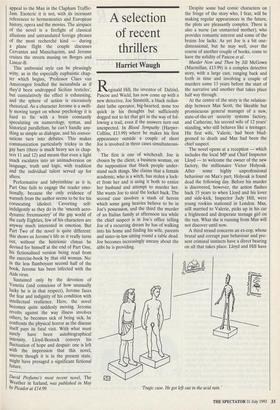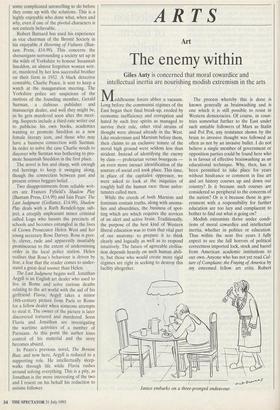A selection of recent thrillers
Harriet Waugh
Reginald Hill, the inventor of Dalziel, Pascoe and Wield, has now come up with a new detective, Joe Sixsmith, a black redun- dant lathe operator, big-hearted, none too quick in his thoughts but sufficiently dogged not to let that get in the way of fol- lowing a trail, even if the answers turn out unexpected. In Blood Sympathy (Harper- Collins, £13.99) where he makes his first appearance outside a couple of short Joe is involved in three cases simultaneous- ly.
The first is one of witchcraft. Joe is chosen by the client, a business woman, on the supposition that black people under- stand such things. She claims that a female academic, who is a witch, has stolen a lock- et from her and is using it both to entice her husband and attempt to murder her. She wants Joe to steal the locket back. The second case involves a stash of heroin which some gang heavies believe to be in Joe's possession, and the third the murder of an Italian family at afternoon tea while the chief suspect is in Joe's office telling Joe of a recurring dream he has of walking into his home and finding his wife, parents and sister-in-law sitting round a table dead. Joe becomes increasingly uneasy about the alibi he is providing. Despite some bad comic characters on the fringe of the story who, I fear, will be making regular appearances in the future, the plots are pleasantly complex. There is also a nurse (an unmarried mother), who provides romantic interest and some of the brains Joe lacks. As yet Joe is a bit one- dimensional, but he may well, over the course of another couple of books, come to have the solidity of Pascoe et al.
Murder Now and Then by Jill McGown (Macmillan, £13.99) is a complex detective story, with a large cast, ranging back and forth in time and involving a couple of murders some 13 years before the start of the narrative and another that takes place half way through.
At the centre of the story is the relation- ship between Max Scott, the likeable but promiscuous general manager of a new, state-of-the-art security systems factory, and Catherine, his second wife of 12 years' standing, who still behaves like a teenager. His first wife, Valerie, had been blud- geoned to death and Max had been the chief suspect.
The novel opens at a reception — which includes the local MP and Chief Inspector Lloyd — to welcome the owner of the new factory, the millionaire Victor Holyoak. After some highly unprofessional behaviour on Max's part, Holyoak is found dead the following day. Before his murder is discovered, however, the action flashes back 15 years to when Lloyd and his lover and side-kick, Inspector Judy Hill, were young rookies stationed in London. Max, still married to Valerie, picks up in his car a frightened and desperate teenage girl on the run. What she is running from Max will not discover until now.
A third strand concerns an ex-cop, whose brutal and corrupt past behaviour and pre- sent criminal instincts have a direct bearing on all that takes place. Lloyd and Hill have Tragic case. He got left out in the acid rain.' some complicated unravelling to do before they come up with the solutions. This is a highly enjoyable who done what, when and why, even if one of the pivotal characters is not entirely believable.
Robert Barnard has used his experience as vice chairman of the Bronte Society in his enjoyable A Hovering of Vultures (Ban- tam Press, £14.99). This concerns the shenanigans surrounding a society set up in the wilds of Yorkshire to honour Susannah Sneddon, an almost forgotten woman writ- er, murdered by her less successful brother on their farm in 1932. A black detective constable, Charlie Peace, is sent to keep a watch at the inauguration meeting. The Yorkshire police are suspicious of the motives of the founding member, Gerald Suzman, a dubious publisher and manuscript dealer, and well they might be, as he gets murdered soon after the meet- ing. Suspects include a third-rate writer out to publicise his own books, academics wanting to promote Sneddon as a new female literary icon, and those who may have a business connection with Suzman. In order to solve the case Charlie needs to discover why Suzman was bothering to pro- mote Susannah Sneddon in the first place.
The novel is fun and sharp, with enough red herrings to keep it swinging along, though the connection between past and present crimes beggars belief.
Two disappointments from reliable writ- ers are Frances Fyfield's Shadow Play (Bantam Press, £14.99) and lain Pears' The Last Judgment (Gollancz, £14.99). Shadow Play deals with a Ruth Rendell-type sub- ject, a creepily unpleasant minor criminal called Logo who haunts the precincts of schools and becomes entangled in the lives of Crown Prosecutor Helen West and her young secretary Rose Darvey. Rose is pret- ty, clever, rude and apparently insatiably promiscuous to the extent of undermining order in the local police station. Helen realises that Rose's behaviour is driven by fear, a fear that the reader comes to under- stand a great deal sooner than Helen.
The Last Judgment begins well. Jonathan Argyll is an English art dealer who used to live in Rome and solve curious deaths relating to the art world with the aid of his girlfriend Flavia. Argyll takes a minor 18th-century picture from Paris to Rome for a fellow dealer when someone attempts to steal it. The owner of the picture is later discovered tortured and murdered. Soon Flavia and Jonathan are investigating the wartime activities of a number of Parisians. At this point the author loses control of his material and the story becomes absurd.
In Pears's previous novel, The Bernini Bust, and now here, Argyll is reduced to a supporting role. He intellectually sleep- walks through life while Flavia rushes around solving everything. This is a pity, as Jonathan is the more interesting of the two and I resent on his behalf his reduction to asinine follower.



















































 Previous page
Previous page